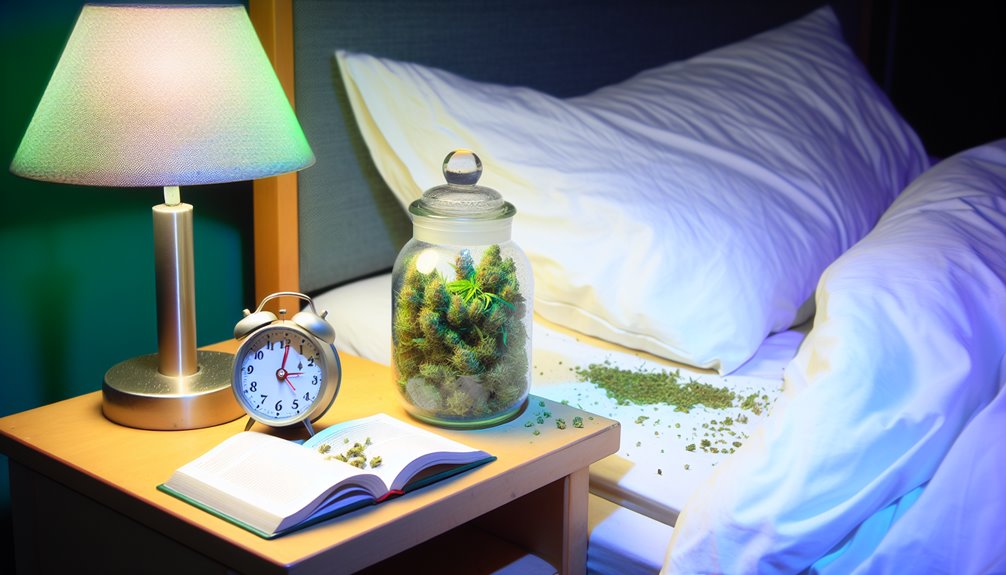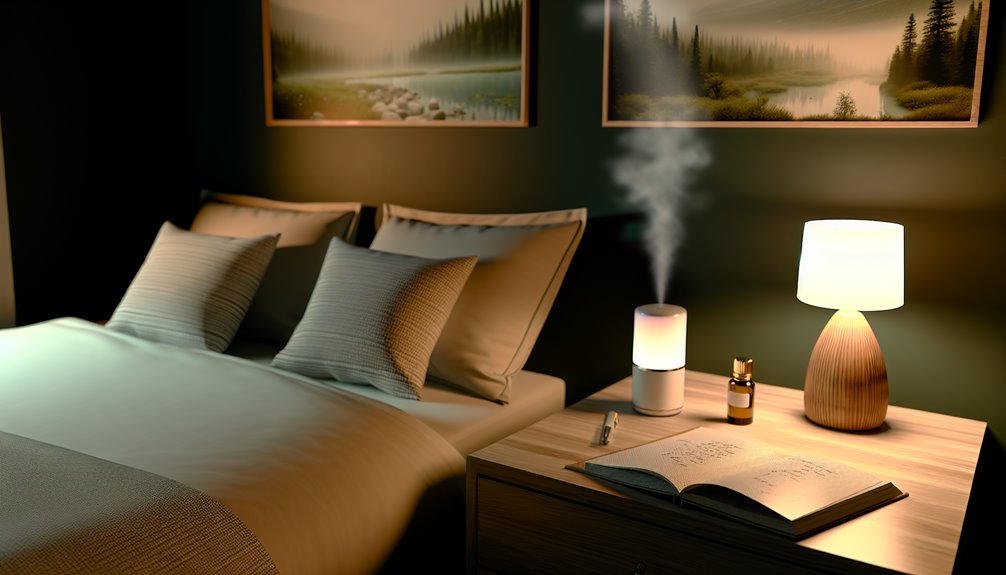Imagine yourself tossing and turning, unable to find the peaceful domain of sleep. You've tried everything from counting sheep to warm milk, with no relief. Now, you're considering medical marijuana. Research suggests that cannabinoids like THC and CBD may influence sleep patterns. For instance, THC may help you fall asleep, while CBD could improve sleep quality by reducing anxiety and pain. However, the long-term effects of cannabis on sleep are still hazy, leaving you wondering about the best dosing and cannabinoid proportions for effective sleep management. Will you find solace in the arms of medical marijuana for your sleep disorder? Let's explore this intriguing possibility together.
Understanding the Complex Nature of Sleep Disorders

Understanding the complex nature of sleep disorders is vital in today's era, as they affect a significant portion of the adult population. Sleep architecture can be disrupted by a host of disorders, including insomnia, sleep-disordered breathing, central disorders of hypersomnolence, circadian rhythm sleep-wake disorders, and parasomnias. Insomnia, characterized by difficulty initiating or maintaining sleep, is one of the most common disorders, triggered by various factors such as environmental stress, genetic predispositions, and psychological issues. These triggers often lead to hyperarousal, further disrupting sleep. Other disorders like sleep apnea are largely influenced by obesity, while central hypersomnia is due to abnormalities in the central nervous system's control of sleep-wake. Additionally, disorders like restless leg syndrome can lead to uncomfortable sensations in the legs, causing sleep interruptions. Understanding these disorders, and the significant impact they have on the quality of life, is vital in providing effective care.
An Overview of Medical Marijuana: Properties and Uses
Diving into the heart of the matter, let's discuss the properties and uses of medical marijuana. It contains over 100 different chemicals, known as cannabinoids, with THC and CBD being the most prevalent. These components interact with your body's endocannabinoid system, resulting in a range of cannabinoid benefits.
Medical marijuana, despite its lack of FDA approval, is legal in several states and used for various therapeutic applications. It's often used for pain relief, controlling nausea, and reducing muscle spasms. Furthermore, it's also FDA-approved for specific seizure disorders. Off-label uses include treating conditions like anxiety disorders and sleep disorders. However, it's vital to take into account the potential side effects and dosage for safe and effective use. Interestingly, it's also believed to modestly reduce pain in conditions like nerve damage, cancer, and arthritis, making it a potential alternative for conventional pain medications modestly reduce pain. Medical marijuana's impact on sleep disorders will be discussed in detail in the upcoming section.
The Role of Cannabinoids in Sleep Regulation

When it comes to sleep regulation, cannabinoids such as THC and CBD play a significant role. They interact with your body's endogenous cannabinoid system, influencing neurotransmission and neuroendocrine signaling pathways that are central to sleep regulation. Here's how they work:
- THC initially promotes sleep onset but can disrupt sleep continuity and architecture with chronic use due to its partial agonist action on the cannabinoid type 1 receptor.
- CBD can improve sleep quality by alleviating underlying conditions such as anxiety and pain through its interaction with several receptor sites.
- Chronic use of cannabinoids, particularly THC, can alter sleep architecture, reducing the duration of slow-wave sleep and affecting the overall sleep-wake cycle.
Understanding these cannabinoid mechanisms can help you better serve patients with sleep disorders.
Current Research on Medical Marijuana and Sleep Disorders
While there's a growing body of evidence suggesting the potential benefits of medical marijuana for sleep disorders, it is important to explore deeper into the current research findings. Current trends indicate that short-term use of medical marijuana can reduce sleep onset latency, improve sleep quality, and increase light sleep. But, long-term use may lead to worsening sleep quality and the return of insomnia. The clinical implications are clear: it is vital to balance the potential benefits and risks. For conditions like chronic pain, anxiety, PTSD, and restless leg syndrome, medical marijuana shows promise in improving sleep. However, systematic reviews and clinical trials suggest the effectiveness can wane over time, with about 1 in 13 patients experiencing improved sleep quality.
Patient Testimonials: Experiences With Medical Marijuana for Sleep

Although medical marijuana's impact on sleep disorders has been studied extensively, individual patient testimonials offer unique insights into these experiences. Many patients report considerable sleep improvement, attributing it to the pain-relieving properties of medical marijuana. This is particularly evident among those struggling with chronic conditions such as arthritis and degenerative disc disease.
From these patient experiences, we can highlight:
- Medical marijuana's role in reducing reliance on pain medications, potentially mitigating side effects and addiction risks.
- The reported increase in sleep duration, often achieving 7-9 hours per night.
- The efficacy of different forms of consumption, such as tincture oil and vape pens, in promoting sleep.
These testimonials underscore the potential of medical marijuana in addressing sleep disorders, providing valuable insights for those dedicated to serving others.
Evaluating the Risks and Side Effects of Using Medical Marijuana
Understanding the potential risks and side effects of using medical marijuana is as crucial as recognizing its benefits. In risk assessment, consider both short and long-term effects. Short-term, you may experience euphoria, altered senses, impaired memory, and increased heart rate. Long-term, you could face learning difficulties, increased risk of mental health disorders, heart disease, and even addiction. There are also health and development risks, such as the impact on fetal brain development and increased risk of accidents. Interactions with other drugs and contaminated products pose additional risks. So, your side effect management must involve a rigorous evaluation of these factors. It's important to weigh these risks against the potential benefits for sleep disorders before deciding on this course of treatment.
Reviewing the Legal Aspects of Medical Marijuana for Sleep Disorders

When it comes to the legal aspects of medical marijuana for sleep disorders, the landscape is complex and varies considerably by state. The legal frameworks that govern patient access are often inconsistent and subject to change. For instance, while some states have considered adding sleep disorders to their list of qualifying conditions, others have contested this inclusion, citing insufficient evidence.
- States like Minnesota have temporarily included conditions like sleep apnea, only to face opposition from medical bodies.
- Medical organizations such as the American Academy of Sleep Medicine discourage medical cannabis use for sleep apnea, favoring proven therapies.
- State regulations dictate access and usage, often diverging from federal law, making compliance a must for patients.
Insight From Healthcare Professionals: When Is Medical Marijuana Recommended?
So, what is the professional stance on utilizing medical marijuana for sleep disorders? While evidence for its general use remains limited, healthcare recommendations highlight its potential benefits for specific conditions. The American Academy of Sleep Medicine advises against its use for sleep apnea, citing inadequate evidence and potential risks. However, for sleep issues related to chronic pain, PTSD, or MS, medical marijuana might offer relief. It is crucial to recognize that short-term benefits may give way to long-term concerns, like worsening sleep quality and possible withdrawal symptoms. Patient considerations, such as potential daytime sedation and driving impairment, must also be factored in. Ultimately, consulting with a healthcare provider is key to ensuring safe and effective use.
Alternative Treatments for Sleep Disorders: a Comparison With Medical Marijuana

While medical marijuana has its potential benefits and drawbacks for treating sleep disorders, you might also consider exploring alternative treatments.
- Acupuncture benefits: It's been found superior in increasing total sleep time and efficiency, and decreasing wake after sleep onset. It's a safe alternative with minimal side effects.
- Mind-Body Interventions: These greatly improve sleep quality and reduce insomnia severity, though their effect on objectively assessed outcomes remains inconclusive.
- Melatonin effectiveness: It's proven effective in reducing sleep onset latency, both self-reported and objectively assessed. However, its safety for long-term use is still under research.
These alternatives, along with exercise and relaxation therapy, offer diverse solutions for sleep disorders. They each have their merits, and understanding their effectiveness can guide you to make an informed choice.
Looking Ahead: The Future of Medical Marijuana in Sleep Medicine
As we venture into the future of medical marijuana in sleep medicine, it is vital to contemplate the latest research and findings. Current studies show mixed results, with cannabinoids like THC and CBD affecting sleep in different ways. Your understanding of these complex interactions is key to serving your patients effectively. Future research will focus on the long-term effects of cannabis on sleep, the best dosage, and cannabinoid ratios for sleep improvements. It is important to remain informed about these developments, given the increasing number of patients turning to medical marijuana as a sleep aid. As legalization trends continue, you'll play a pivotal role in educating patients about the potential benefits and downsides of using cannabis for sleep.
Conclusion
The journey to understand medical marijuana's role in sleep disorders is like piecing together a vast, intricate puzzle. With promising research, patient testimonials, and professional insights, it's evident that cannabis has potential. But remember, it's not a one-size-fits-all solution. Your personal health should always be the top priority. As we explore deeper into the science, may we find the right piece to complete the sleep disorder treatment puzzle. Sleep tight, the answer might just be around the corner.
If you're curious to learn more about how medical marijuana can help with sleep disorders, I invite you to visit Fells Point Cannabis Docs of Maryland or give them a call at (410) 401-4200. The friendly staff is ready to answer your questions and guide you on your journey to better sleep. Let's explore the possibilities together!

